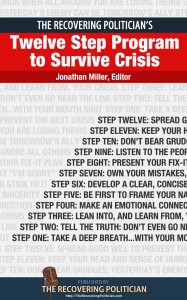In the midst of my tenure in office as a Pennsylvania state representative, a statewide scandal uprooted the political landscape like a tornado of Wizard of Oz proportions. For those of us unscathed and continuing work in Pennsylvania’s Capitol, we were still left with a “we’re-not-in-Kansas-anymore” reality that proved tense, to say the least.
“Bonusgate” was the pithy pet name for a massive investigation into political corruption in which millions of taxpayer dollars were misappropriated as bonuses to legislative staffers who were campaigning while on the clock.
The investigation wound together deceit, cover-ups and political finger pointing into a whirlwind that swept up some of the state’s longest serving lawmakers. Some of my colleagues caught up in the storm of rapid-fire reporter questions and constituent scorn landed not in Oz, but in jail. Many more were thrown out of office, as voters took their anger to the polls and elected one of the largest freshmen classes in the state’s history. It was a scary time to be a state representative.
Just as a point of reference, I should note that Pennsylvania is one of the few states to employ a full-time legislature and no term limits. For those who choose to run for office and succeed, there is a scary realization that your career and income is suddenly in the hands of voters. And while I will defend the importance of maintaining a full-time legislature, I’ll admit that the overlying threat of getting the potential “pink slip” at the polls leads to a protective instinct that’s palpable around the Capitol. The desire to survive creates a sub-culture of risk-taking, and even forces a select few to cross the line between right and wrong. This is my assessment of what creates corruption, at least in this case.
When the Attorney General released the first of many findings in the Bonusgate investigation, careers and reputations were ruined almost instantly, and the career carnage kept coming. Fortunately, I was a Bonusgate bystander, a safe distance from the action.
Until one morning, I wasn’t.
When the reporter contacted me to get my side of the story on the juicy tidbit of information he had, supposedly tying my top aide to Bonusgate, I responded openly and with the same nothing-to-hide style that was the core of my political reputation.
 Still, by the time I hung up the phone, my stomach was in my throat. The mere thought of the article hitting newsstands consumed my thoughts and nerves. I tried to hope for the best, like a sidebar blurb buried somewhere in the back of the paper.
Still, by the time I hung up the phone, my stomach was in my throat. The mere thought of the article hitting newsstands consumed my thoughts and nerves. I tried to hope for the best, like a sidebar blurb buried somewhere in the back of the paper.
The resulting banner headline that greeted me soon after was the antithesis of any style or reputation I had cultivated, and it was far from hidden. Instead, it alluded to a direct link between my senior staffer and some of those who had fallen the farthest in our state’s scandal.
In reality, the full-color, front-page exposé was all style, no substance. The emails cited were taken out of context. The source faced criminal conviction and had already established a jailhouse-snitch notoriety for trying to invite company into his misery. And the fact was that my staffer had not pocketed any tax dollars for his time spent on the campaign trail.
Still, the timing of the story and the wording in the headline alone suggested a cover up that could only serve to outrage vexed voters even more.
I processed the article like a boxing match transpiring in slow motion. I saw the heavyweight square up, cock his arm and start to pivot slowly as his fist came straight for my face. The best I could hope for was a permanent black eye, but I’d seen this fight before, and it typically ended in a total knockout.
My phone rang before impact. It was my staffer and subject of aforementioned article. We had a conversation that I vaguely recall as, “Oh crap! Oh crap! Oh crap!”
===
Click here to read the rest of Jennifer Mann’s chapter by purchasing The Recovering Politician’s Twelve Step Program to Survive Crisis for only 99 cents this week only.










Leave a Reply